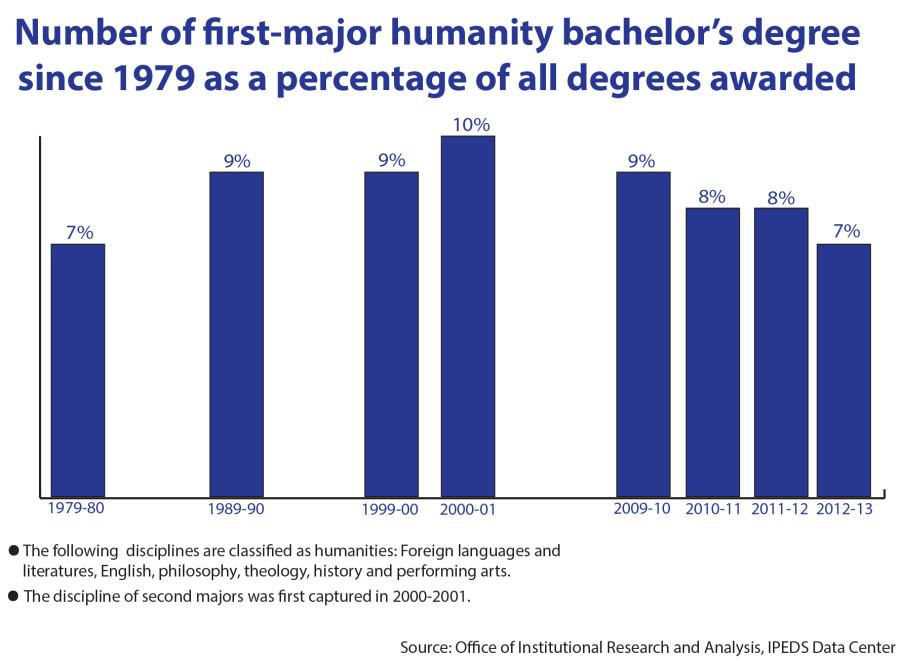As students across the country flock toward degrees close to the professions and away from those in the humanities, Marquette is resisting the trend.
Since the 1970s, the number of college students seeking humanities degrees nationwide has plummeted. According to an Oct. 30 article in The New York Times, 7 percent of students nationwide are working toward a degree in the humanities – half as many proportionally as in 1970. Harvard University alone experienced a 20 percent decline in humanities majors over the last decade.
At the same time, Marquette’s numbers in humanities majors remained fairly consistent.
A report from Marquette’s Office of Institutional Research and Analysis indicates that 7 percent of all degrees earned at Marquette were for humanities majors in the 2012-13 academic year. This has not changed much over the years since the 1979-80 academic year, which also awarded 7 percent of its diplomas to humanities majors.
Humanities degrees at Marquette reached its peak in the 2000-’01 academic year, making up 10 percent of all diplomas awarded that year.
In fact, specific degrees, like English and foreign languages, actually increased. The number of English degrees awarded rose from 3.2 percent in 2004 to 3.6 percent in 2013. Foreign languages, literature and linguistics degrees also jumped about 2 percent during the nine-year period.
Richard Holz, dean of the College of Arts & Sciences, explained a large reason for the humanities not declining at Marquette is because they are the cornerstone of Marquette’s Jesuit pedagogy.
“I think it has remained strong at Marquette because we have outstanding faculty in the humanities who are passionate about their disciplines,” he said. “As a Jesuit institution, we have a responsibility to develop our student’s intellect to the full measure of their talents. The humanities are central to this goal of preparing students to both lead and serve others.”
The national numbers do not reflect this mindset.
According to the National Center for Educational Statistics, 31,922 (3.4 percent) of the 935,140 Bachelor’s degrees granted in the academic year of 1980-1981 were for English language or literature, 100,513 (10.7 percent) were for social sciences and history and 6,776 (.72 percent) were for philosophy and religious studies. But during the 2009-2010 academic year, English literature and social sciences and history both dropped to 3.22 percent and 10.47 percent, respectively, with only philosophy and religious studies rising to .75 percent.
The report showed degrees in other fields, such as business, remained relatively steady nationwide, moving from 21.4 percent to 21.7 percent between these same years.
Even with a consistent number of degrees being awarded, job outlook for those who study the humanities is bleak.
According to a report from the Modern Language Association, the number of departments and institutions placing ads for English employment was only 1,011 in 2012-13, compared to 1,646 in 2007-08.
Still, professor of English Albert Rivero maintains faith in the importance of studying the humanities.
“In short, a humanities degree might well be the best choice for college students because, rather than preparing them for jobs in specific fields, it provides them with transferable skills crucial to succeeding in a job market not always defined by narrow professional or vocational categories,” Rivero said.
According to a 2012 article in Forbes, employers look for more in prospective employees than simply knowing the terminology and technology. Some of the more crucial skills they look for include active listening and critical thinking skills.
“Many students mistakenly assume that an undergraduate degree from a professional school or college will be more useful on the job market,” he said. “I say ‘mistakenly’ because the skills most employers are looking for – critical thinking and competence in writing – are skills better learned or acquired in pursuing a humanities degree.”
This makes Hannah Mullett, a sophomore in the College of Arts & Sciences, hopeful for her future. Mullett is majoring in writing-intensive English with plans of becoming a lawyer. She said she hopes the skills learned from pursuing a humanities major will give her an advantage over other law school applicants.
“I believe it’s important for people to know how to carry themselves, and it’s impressive when people can hold the attention of others when they speak,” she said. “I want to be a lawyer, so communication is essentially what I’m going to be surviving off of. So I know that if I can communicate well through learning English I’ll be good at what I do.”

